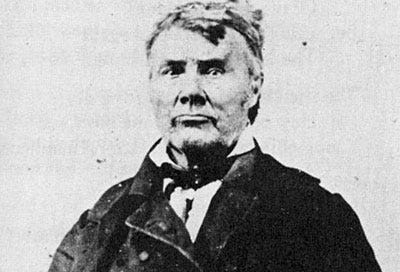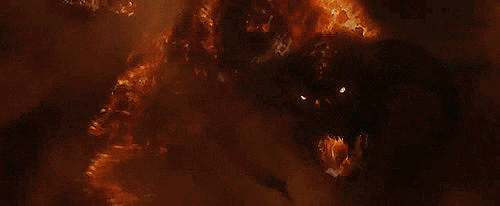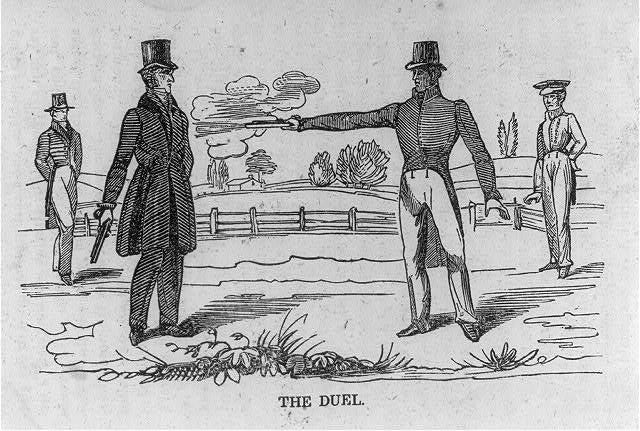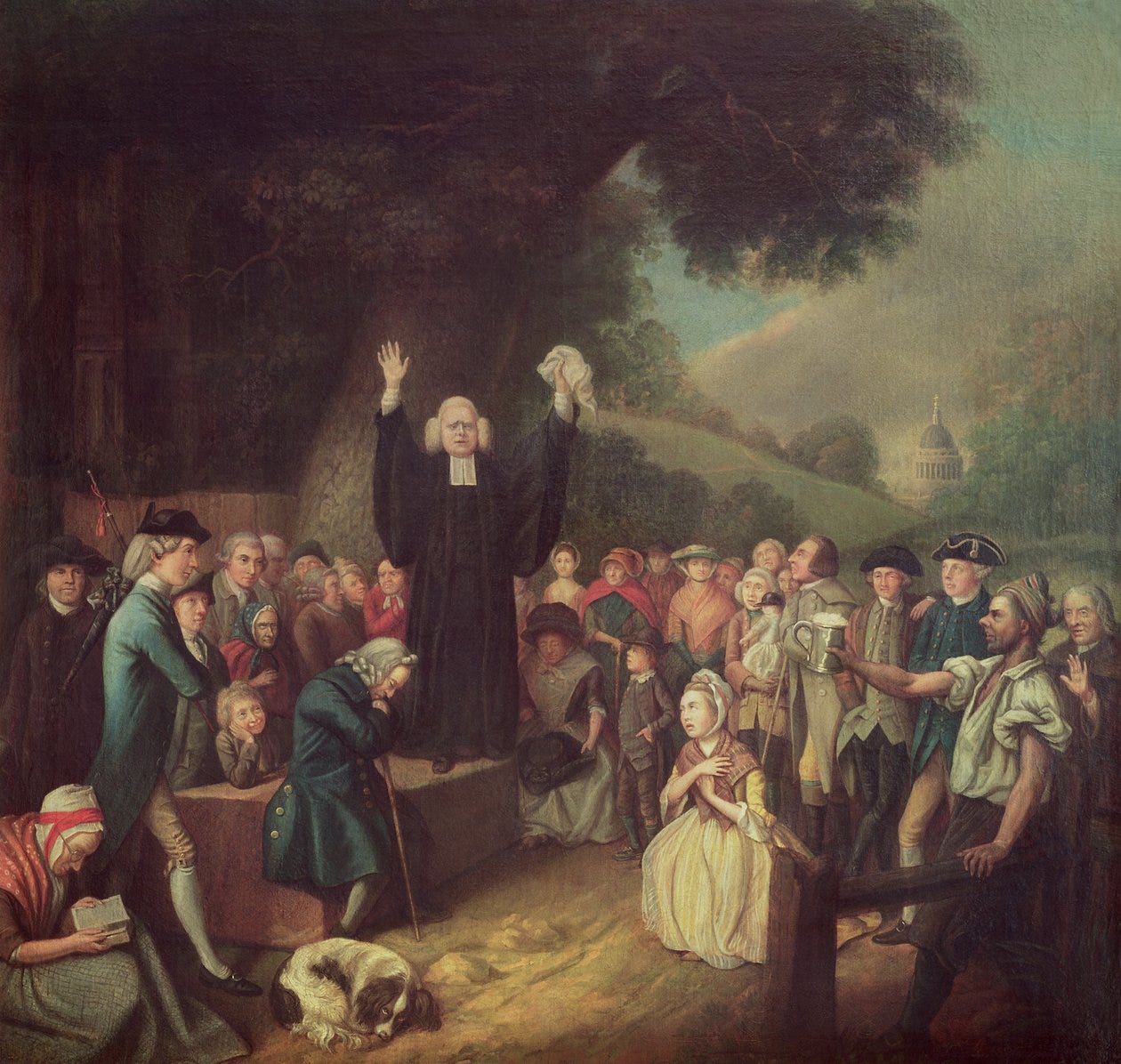A common lament on the right is that actual existing Christianity in the West is an effeminized shell of what it once was. The based pagans would have it that this was always the case, though they also think the faith is a cult centered on a volcano demon, which honestly sounds pretty metal. But most people understand that even in the recent past there was a level of violent enthusiasm innate to Christianity that has, to put it mildly, tapered off of late. Why this is is a matter of some conjecture.
Above: A scene from Cecil B. DeMille’s The Ten Commandments
Liberalism has certainly played its part. Itself the misbegotten spawn of Protestant factionalism, liberalism is a religious creed masquerading as a political one, which amounts to a system in which God is largely indifferent to what we believe so long as our actions are in accordance with the basic liberal understanding of the universe- that all men are exactly equal, atomized individuals who relate to each other by means of contracts. Granted, God Himself relates to man through covenants, but His deals reflect a transcendent reality of which He is the head, as opposed to the rather sordid private moralities we construct among each other. It’s a vision of freedom as the absence of restraint. It’s not Christian, but it is profoundly attractive nonetheless, and much of a modern Christian’s life is spent trying to reconcile the competing ethical claims of his faith and the ideology he is marinated in from the time he enters the world. It’s a problem for all of us.
The solution is as simple as it is difficult. You have to suffer. The essence of manliness is the acceptance of the burden of suffering for higher things, and a manly Christianity can only be one in which that notion is explicit and lived. You have to choose to reject what’s around you for what’s better, constantly and unhesitatingly. I say this of course as someone who doesn’t do it nearly enough, but there it is. The best Christians throughout history have always been those who were the most among us while being the least of us. If everyone loves you, you’re doing something wrong, just as much so as if you don’t, in turn, love everyone. The essence of manliness is the acceptance of the burden of suffering for higher things, and a manly Christianity can only be one in which that notion is explicit and lived.
Paradoxes like this are best understood not through words, but through actions. One can compare a life lived in the world with one lived for it by understanding how people respond to the competing claims of the temporal and the spiritual. We all fall, of course, but much like fitness, faith is seldom one big choice, but the sum of thousands of small ones, commitments renewed daily, hourly, minute-by-minute. There are innumerable examples from the Bible and the lives of saints that illustrate this, but as I’m in America, in the Deep South, an area known as the Bible Belt for its Protestant energy, I thought I might use as an example of a once-famous but now somewhat obscure preacher, Peter Cartwright.
Peter Cartwright was born in Virginia in 1785. Like many people seeking better prospects, his family moved west into Kentucky, where young Peter grew up. The frontier then was a bit like settled life now, a place of novelty and anomie, where a lack of rootedness and tradition fostered an inclination toward self-indulgence rather than the higher things. The South was not then known for its religiosity. The people who settled there were generally the scions of Scots-Irish clans, a continually-uprooted (and uprooting) race prone to violence and vice, though their energy could also be turned toward more constructive ends. Peter Cartwright grew up among his people and absorbed their culture.
The level of culture was then- like now- quite low, and seeking out what we might now call quick dopamine hits was the practical goal of whatever periods of life weren’t devoted to subsistence. As they had no video games or sportsball, this meant pervasive gambling, which was of course accompanied by pervasive drinking, which was of course accompanied in turn by pervasive interpersonal violence. Recall that Andrew Jackson, a person of substance and position, killed a man over a horse bet and nearly died in a pointless shootout in a hotel lobby. The gossipy insularity of rural culture certainly didn’t help, nor did the fact that life on the edge of civilization was often short and abruptly ended even without the murders.
It’s a good thing they didn’t have March Madness.
Cartwright was typical in that way, at least at first. In his autobiography he described his youth thusly:
I was naturally a wild, wicked boy, and delighted in horse-racing, card-playing, and dancing. My father restrained me but little, though my mother often talked to me, wept over me, and prayed for me, and often drew tears from my eyes; and though I often wept under preaching, and resolved to do better and seek religion, yet I broke my vows, went into young company, rode races, played cards, and danced. At length my father gave me a young race-horse, which well-nigh proved my everlasting ruin; and he bought me a pack of cards, and I was a very successful young gambler; and though I was not initiated into the tricks of regular gamblers, yet I was very successful in winning money. This practice was very fascinating, and became a special besetting sin to me, so that, for a boy, I was very much captivated by it. My mother remonstrated almost daily with me, and I had to keep my cards hid from her; for if she could have found them, she would have burned them, or destroyed them in some way. Oh, the sad delusions of gambling! How fascinating, and how hard to reclaim a practiced gambler! Nothing but the power of Divine grace saved me from this wretched sin.
Were he alive today he would have no less scope for his addictions, and indeed, the science that was in his day in its infancy has given shape to engineered addictions that Cartwright couldn’t have imagined. Our frontier is digital. He realized that gambling was enslaving him, but he lacked the power of his own will to change. Not even his mother’s tears could break him of his debilitating habits. What saved him was the awesome power of Methodism.
Confused? Not as much as this guy.
I’m sure this has some of you scratching your heads in puzzlement. Methodism today represents one of many low points to which mainline Protestantism has sunk. The recent general convention instantiated the defeat of what conservative forces remained in the denomination, as was covered in sad detail by Juicy Ecumenism. Yes, I know there are Methodists who don’t belong to the UMC and yes I know your particular congregation is based; there’s no need to remind me in the comments. But as difficult as it is to imagine today, Methodism once represented a powerful, indeed revolutionary religious and social force in America and beyond.
The movement began in Britain as a call to reform within the Anglican Church. That institution, founded as a compromise solution to sectarian violence within England, was a state church in the truest sense, and focused mainly on inculcating docility among the populace and providing jobs for educated men who might otherwise be drawn to destabilizing political adventures. This left what some saw as a gap in the devotional and participatory aspects of Christianity, most notably brothers John and Charles Wesley. They developed a schedule of prayer and self-examination (a ‘method’) and instilled an impulse to charity and missionary activity among their growing band of followers.
One of the most notable converts was a man named George Whitefield (pronounced ‘whit-field’) a former bartender with a gift for oratory, who became the first great religious celebrity in North America when he toured the colonies in the 1740s. He was intensely charismatic, theatrical, and appealing to women, who along with curious men flocked to his open-air sermons in the thousands.
And they didn’t come without beer.
Whitefield was a major figure in the First Great Awakening, the first of a series of religious revivals that would sweep American religious life and essentially create Evangelical Protestantism, with its low-church missionary zeal and nebulous doctrinal boundaries. Sermons like his were powerful emotional events, with audiences crying, screaming out in terror of hellfire, and collapsing into seizures and catatonia. Ben Franklin, a friend of Whitefield’s despite himself not being a believer, noted wryly:
The Multitudes of all Sects and Denominations that attended his Sermons were enormous and it was [a] matter of Speculation to me who was one of the Number, to observe the extraordinary Influence of his Oratory on his Hearers, and how much they admir’d and respected him, notwithstanding his common Abuse of them, by assuring them they were naturally half Beasts and half Devils.
Whitefield was aware of the mesmerizing effect of his preaching and to his credit used it (mostly) for good. In keeping with the Methodist credo he worked hard to create charitable organizations and was good at soliciting donations. Even Franklin- who in addition to being a skeptic was a noted skinflint- was moved by Whitefield to literally empty his wallet for the orphanage Whitefield sought to build in Georgia, which still exists as a school in Savannah.
I happened soon after to attend one of his Sermons, in the Course of which I perceived he intended to finish with a Collection, and I silently resolved he should get nothing from me. I had in my Pocket a Handful of Copper Money, three or four silver Dollars, and five Pistoles [Spanish coins] in Gold. As he proceeded I began to soften, and concluded to give the Coppers. Another Stroke of his Oratory made me asham’d of that, and determin’d me to give the Silver; and he finish’d so admirably, that I emptied my Pocket wholly into the Collector’s Dish, Gold and all.
The First Great Awakening died away in the freethinking period leading up to the War for Independence, but in the wake of the French Revolution, Napoleon, and the general bloody turmoil of Enlightenment rationalism came a new revival. This one would spread beyond the coasts and areas with established religious communities into the savage heart of the unchurched frontier. The same masculine energy that felled trees and Indians alike in the name of civilization was coming apart in drunken anarchy. This was not merely the opinion of preening Yankees and Lowcountry elites; those in the midst of it felt the absence of meaning and right order, none more so than young Peter Cartwright. In his autobiography, he says this about his conversion.
In 1801, when I was in my sixteenth year, my father, my eldest half brother, and myself, attended a wedding about five miles from home, where there was a great deal of drinking and dancing, which was very common at marriages in those days. I drank little or nothing; my delight was in dancing. After a late hour in the night, we mounted our horses and started for home. I was riding my race-horse.
A few minutes after we had put up the horses, and were sitting by the fire, I began to reflect on the manner in which I had spent the day and evening. I felt guilty and condemned. I rose and walked the floor. My mother was in bed. It seemed to me, all of a sudden, my blood rushed to my head, my heart palpitated, in a few minutes I turned blind; an awful impression rested on my mind that death had come and I was unprepared to die. I fell on my knees and began to ask God to have mercy on me.
It’s interesting that his conviction of his sinfulness was not the result of anything we would today regard as especially bad. It really seems like it was not merely the frivolity of the dancing, but of everything in general; the way he “spent the day and evening” were the problem, because it was pretty much the way he spent all of his free time. Like so many young men today, he harbored guilt about the meaninglessness of the all-consuming nature of his hobbies; he was being entertained to death by an indifferent society. He wanted more, and it was the Methodists who offered him what he want most, salvation through purpose.
The Methodists were already active on the frontier, the vanguard force of the Second Great Awakening. In an environment with few large, purpose-built structures, indoor preaching was far less common than elsewhere, and the Methodists developed their familiar practice of holding camp meetings, large outdoor revivals featuring days of emotive preaching to audiences gathered from the surrounding area:
To this meeting I repaired, a guilty, wretched sinner. On the Saturday evening of said meeting, I went, with weeping multitudes, and bowed before the stand, and earnestly prayed for mercy. In the midst of a solemn struggle of soul, an impression was made on my mind, as though a voice said to me, “Thy sins are all forgiven thee.” Divine light flashed all round me, unspeakable joy sprung up in my soul. I rose to my feet, opened my eyes, and it really seemed as if I was in heaven; the trees, the leaves on them, and everything seemed, and I really thought were, praising God. My mother raised the shout, my Christian friends crowded around me and joined me in praising God; and though I have been since then, in many instances, unfaithful, yet I have never, for one moment, doubted that the Lord did, then and there, forgive my sins and give me religion.
Thus converted, Cartwright determined that he would help others achieve the same liberatory experience and become a preacher himself. He was quite young and had little education, but his zeal impressed the local Methodist leadership and he became a clergyman a year after his experience in the camp meeting. Cartwright was a circuit rider, an itinerant evangelist presiding over a territory of at least ten-thousand square miles. Sometimes they worked in teams, but Cartwright and the other Methodists might just as easily find themselves alone, riding through the trackless hollows of the frontier, a place where the Indians still represented a lingering but lethal threat, with bears and bobcats and rattlesnakes, or else the simple accident of falling off one’s horse that might result in your lonely corpse being left to scavengers in the wilderness, with only God knowing your fate. This is the life that Peter Cartwright embraced.
Same vibes
Cartwright’s work was cut out for him. For all the zeitgeist around spirituality, he had to contend with the very manifest attractions of worldly life. Even for those who came to his camp meetings, there were other attractions than the hymnal. A quote attributed to Lorenzo Dow had it that “as many souls are begotten as saved” at the revivals, as they were a rare chance for lots of single (or otherwise) young people to mingle while their elders were too preoccupied to notice them sneaking off. But the amorous were the least of a preacher’s problems. The rampant, drunken, dimwitted violence that characterized the locals didn’t disappear when a man of God rolled into town. What for some represented an opportunity for profound change was for a great many others a chance for something new to destroy. Some simply resented the implication that their debauchery represented anything untoward, especially Cartwright’s bewildering insistence that there was anything wrong with being drunk every moment of the day. Here Cartwright relates an episode that happened in one of his camp meetings. The ‘jerks’ he mentions are the phenomenon of people falling over in a state of religious delirium and spasming uncontrollably:
There was a great work of religion in the encampment. The jerks were very prevalent. There was a company of drunken rowdies who came to interrupt the meeting. These rowdies were headed by a very large drinking man. They came with their bottles of whisky in their pockets. This large man cursed the jerks, and all religion. Shortly afterward he took the jerks, and he started to run, but he jerked so powerfully he could not get away. He halted among some saplings, and, although he was violently agitated, he took out his bottle of whisky, and swore he would drink the damned jerks to death; but he jerked at such a rate he could not get the bottle to his mouth, though he tried hard. At length he fetched a sudden jerk, and the bottle struck a sapling and was broken to pieces, and spilled his whisky on the ground. There was a great crowd gathered round him, and when he lost his whiskey he became very much enraged, and cursed and swore very profanely, his jerks still increasing. At length he fetched a very violent jerk, snapped his neck, fell, and soon expired, with his mouth full of cursing and bitterness . . .
Providence in action. The spontaneous and spectacular nature of the enthusiasms of the camp meeting struck some as undignified, and it could prove embarrassing for men to have their wives and daughters and sisters rolling around on the ground in motions suggestive of a different sort of rapture:
At one of my appointments in 1804 there was a very large congregation turned out to hear the Kentucky boy, as they called me. Among the rest there were two very finely-dressed, fashionable young ladies, attended by two brothers with loaded [with lead weights; a weapon] horsewhips. Although the house was large, it was crowded. The two young ladies, coming in late, took their seats near where I stood, and their two brothers stood in the door. I was a little unwell, and I had a phial [bottle] of peppermint [oil] in my pocket. Before I commenced preaching I took out my phial and swallowed a little of the peppermint. While I was preaching the congregation was melted into tears. The two young gentlemen moved off to the yard fence, and both the young ladies took the jerks, and they were greatly mortified about it. There was a great stir in the congregation. Some wept, some shouted, and before our meeting closed several were converted.
As I dismissed the assembly a man stepped up to me, and warned me to be on my guard, for he had heard the two brothers swear they would horsewhip me when meeting was out, for giving their sisters the jerks. "Well," said I, " I’ll see to that."
I went out and said to the young men that I understood they intended to horsewhip me for giving their sisters the jerks. One replied that he did. I undertook to expostulate with him on the absurdity of the charge against me, but he swore I need not deny it; for he had seen me take out a phial, in which I carried some truck [magic potion] that gave his sisters the jerks.
As quick as thought it came into my mind how I would get clear of my whipping, and, jerking out the peppermint phial, said I, "Yes; if I gave your sisters the jerks I’ll give them to you." In a moment I saw he was scared. I moved toward him, he backed, I advanced, and he wheeled and ran, warning me not to come near him, or he would kill me. It raised the laugh on him, and I escaped my whipping. I had the pleasure, before the year was out, of seeing all four soundly converted to God, and I took them into the Church.
When you’re a 19th century Methodist circuit rider, your congregants come to church heavily armed and believe in whatever the Scots-Irish version of voodoo is. It’s really just part of the job you have to accept. Note that things are a bit different nowadays:
The jerks have been replaced with the cringe.
But more often than not, morons would just sort of invade with no better purpose than to bust up something they vaguely understood to be good. In cases like that Cartwright had other ways of getting his message across. Unlike the finely educated and somewhat physically slight Whitefield, Cartwright was a large man quite accustomed to violence in his own right. And while he followed Christ in avoiding quarrels and never stood on his own dignity, he was not one to suffer hindrances to his mission. He would turn the other cheek like any good Christian, but when it came to saving souls, well, that sometimes called for more forceful measures:
Our last quarterly meeting was a camp meeting. We had a great many tents, and a large turn-out for a new country, and, perhaps, there never was a greater collection of rabble and rowdies. They came drunk, and armed with dirks, clubs, knives, and horsewhips, and swore they would break up the meeting. After interrupting us very much on Saturday night, they collected early on Sunday morning, determined on a general riot. At eight o'clock I was appointed to preach. About the time I was half through my discourse, two very fine-dressed young men marched into the congregation with loaded whips, and hats on, and rose up and stood in the midst of the ladies, and began to laugh and talk. They were near the stand, and I requested them to desist and get off the seats; but they cursed me, and told me to mind my own business, and said they would not get down. I stopped trying to preach, and called for a magistrate. There were two at hand, but I saw they were both afraid. I ordered them to take these men into custody, but they said they could not do it.
Cartwright got pretty tired of that crap really fast. He did the proper thing in appealing to law and order. The cops weren’t forthcoming. Time for plan B. Cartwright grabbed one of the men off the chair by his collar and slammed him to the ground, which set off a general melee between the congregants and the rowdies.
Here we see a historical recreation featuring The Big Show
It is at this point that law enforcement decided to intervene, but in keeping with contemporary best practices for working security at a religious service, they were liquored up too:
An old and drunken magistrate came up to me, and ordered me to let my prisoner go. I told him I should not. He swore if I did not he would knock me down. I told him to crack away. Then one of my friends, at my request, took told of my prisoner, and the drunken justice made a pass at me; but I parried the stroke, and seized him by the collar and the hair of the head, and fetching him a sudden jerk forward, brought him to the ground, and jumped on him. I told him to be quiet, or I would pound him well.
Now also beating up the local cops, Cartwright gets attacked by the chief instigator of the violence:
The mob then rushed to the scene; they knocked down seven magistrates, and several preachers and others. I gave up my drunken prisoner to another, and threw myself in front of the friends of order. Just at this moment the ringleader of the mob and I met; he made three passes at me, intending to knock me down. The last time he struck at me, by the force of his own effort he threw the side of his face toward me. It seemed at that moment I had not power to resist temptation, and I struck a sudden blow in the burr of the ear and dropped him to the earth.
Here Dan Henderson reenacts the scene with cooperation of Michael Bisping.
Making a belt means tanning hides, and the Bible Belt was no exception. It takes hard men to evangelize a hard people, whether that manifests as criminal malice or a hard shell of consumerist indifference. There is a place for academic debate and theological nuance; C.S. Lewis appealed to me far more than the emotive TV preachers of my youth. But there is also a need for men willing to struggle alongside their brothers in the world in a way those men understand. For the Greeks, the Areopagus and the unknown God. For the Germans, the disciples as the posse comitatus of Christ the Dux Bellorum. And for the men of the rural South, love with the occasional admixture of fisticuffs.
Cartwright would stay a preacher throughout his life, and never compromised in his beliefs. His neighbors in the South grew to resent his increasingly anti-slavery opinions, so he moved to Illinois and won a seat in Congress, defeating an up-and-coming Abraham Lincoln. However, his new neighbors grew to resent his increasingly anti-alcohol opinions, and he subsequently lost out in a re-election to the man who would one day be president. By then the Second Great had run its course, though other movements would later hive off from Methodism, most notably the various Pentecostal sects that retained the early emotive preaching style and emphasis on physical manifestations of Grace. Despite his lack of (and early skepticism of) theological education, Cartwright would spend his later years founding colleges for training ministers, all of which still exist. As for the Methodists, they’re . . . continuing…
I don’t want to end by cuckdunking, but with a call to reclaim that fighting spirit. Peter Cartwright and his peers were at war, against Satan, against their own sinful natures, against the world and its temptations. Their lives were manly struggles for higher things. They suffered. There’s a lot there worthy of emulation, and much to be said about how to turn things around. The answers are there. Once you know what you should want, the only question remaining is, how bad do you want it.
Peter Cartwright













Good essay. Reminded me of Fr Navarre A teacher I had in high school. He was Spanish Basque; first son inherits, second joins the military, third the priesthood. A quiet guy I don't remember him ever raising his voice, let alone a hand, except once.
A guy on the school football team was arguing with him and said he was lucky he had that collar on a elsewise he's punch him out. Well Fr Navarrete took of his collar, stood there tee shirted arms folded, slight smile, didn't say a word. The kid took a mighty swing, next thing he was on the ground out cold. Fr Navarre shrugged raised both hands noting the kid clearly telegraphed his swing, put his priestly garb back on and walked away.
He'd played Jai alai in his Basque youth, ball speed often exceeding 150 mph & had excellent fast reflexes.
Great mini-biography of Peter Cartwright. A lot of history interwoven and very well written as usual.